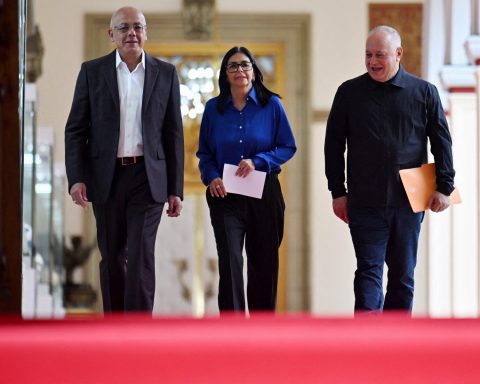President Luis Lacalle Pou closed his second year of government with an approval of 51% and a disapproval of 23%according to data from the consulting firm Option disclosed this Tuesday in Telenoche (Channel 4).
More specifically, 20% think that the management is “very good”, 31% say that it is “good”, 24% indicate that it is “neither good nor bad”, 14% value it as “bad” and 9% understand that She’s so bad”.
The measurement, made between February 17 and 26exhibits “minimal changes” with respect to the valuations of the government management of the previous quarter.
According to the Option report, “in a comprehensive and contextualized view, the balance obtained by the Lacalle Pou administration after two years in power is clearly favorable to the ruling party, with a gap of 28 points between those who openly approve and disapprove of the administration. ”.
The consultant highlights that “the approval records place the government of Lacalle Pou as one of the best evaluated after two years of management among the Uruguayan administrations after the democratic recovery”. In addition, he adds that “in a regional perspective, the Uruguayan government is within the small group of Latin American peers where approval far exceeds disapproval.”
Option points out that “the current levels of approval are lower than those that the government registered in the first months of its mandate” -going from an initial 62% to 51%-, but “with the peculiarity that the loss of political capital of this government has been slight (compared to administrations such as that of Jorge Batlle or the second Vázquez administration)”.
The data indicates that the ten percentage point drop in popularity since the beginning of the government is largely explained by the deterioration of perceptions among the voters of the Broad Front.
“It is observed that the main changes over time have occurred within the Frente Amplio voters, where disapproval has progressively grown and approval has decreased. For example, while in the first year of government the evaluation gap had a negative balance of -27, today it climbs to -42”, says the report. “This means that the deterioration of government approval in the citizenry as a whole in the end-to-end comparison, is mainly explained by changes in the opposition electorate,” adds the Option analysis.
On the contrary, within the ruling party voters “the records have been more stable, with a slight loss of political capital after the first semester of government and levels of disapproval that have been invariably marginal (the maximum was 4% registered in the third quarter of 2021).
Inside of multicolor coalitionLacalle Pou began his government with 92% approval and 1% disapproval. At the end of February, it exhibited 85% approval and 3% disapproval.
Regarding the evaluation by management areas, “the three main ones register positive balances but with clear differences in the levels of support for the management of the pandemic, security and the economy.”
“The agenda of the current government cycle has been dominated by three major issues, two that are usually at the top of citizen concerns (economy and security) and one that broke out due to a global phenomenon as soon as management began (pandemic) ”, says the report.
Regarding health management, there is a “strong consensus”, with 74% of Uruguayans who maintain that the management of the pandemic is good or very good and only 9% disapprove. “This is the only management area where the government has a positive gap within the opposition electorate. Although in terms of infections and deaths, 2021 was a notoriously more turbulent year for the country than 2020, the government managed to maintain strong citizen support in this key area of management, beyond a conjunctural drop registered at the most unfavorable moment in health terms. (2nd quarter of 2021),” the report says.
Regarding public safety, he points out that it is “another important asset of the government, although the figures do not have the forcefulness of the health approval indicators.” “Currently, 46% approve of the government’s work on security, against 24% who disapprove (gap of +22 points). These are registers quite similar to those of the general approval”, affirms Option.
According to the consultant, in this area “the most abrupt change in Uruguayan public opinion is observed with respect to the second Vázquez administration”, since at this same point in the government cycle (2017) only 11% approved of the management in security against to 68% who disapproved.
In the economic area, for its part, “the gap between those who approve (40%) and those who disapprove of the government’s management (30%), with a balance of +10, narrows noticeably,” a record “very similar to that obtained at end of the first year of administration.
“This marks a clear decoupling between the levels of economic approval and those of general approval, a novel aspect with respect to the previous government cycle. In a context of progressive health normalization, the question remains whether economic approval will have a stronger impact on general approval. If so, this would pose a relevant challenge to the government, to the extent that economic approval is today several points below global approval. On the other hand, several economic indicators (especially growth and employment) show clear signs of improvement compared to 2020, which plays in favor of preserving or increasing the image of economic management in the eyes of citizens”, the report states.
How does it translate to referendum?
The consultancy firm Option dedicates a section to analyze how these levels of approval can influence the result of the referendum on the Law of Urgent Consideration, which will take place on March 27.
“Twenty-seven days before the referendum, the current levels of approval constitute a more favorable factor for maintaining the law than its repeal, to the extent that the general image of the government will have an impact on the electoral decisions of the citizenry. However, it is necessary to be cautious for several reasons”, says the consultant.
“On the one hand, our previous public opinion reports have shown that relevant segments that approve of the government’s work are not clearly in favor of maintaining the LUC, with a significant percentage of undecided among them. In other words, the approval of the government has not translated so far into a linear and automatic support for the sky-blue ballot against the repeal. In addition, the main asset of the ruling party in terms of its management image (the pandemic) is not associated with the LUC, so it is feasible that this dimension is not a central element of the campaign in the final stretch or the most important aspect at the time of voting in the referendum”, adds the analysis.
Option concludes that “the current management approval records are a contextual element that plays in favor of maintaining the law but that are part of a broader set of elements that will impact the vote, including the impact of the campaign on the perceptions around the articles and topics of the LUC in dispute”.
















